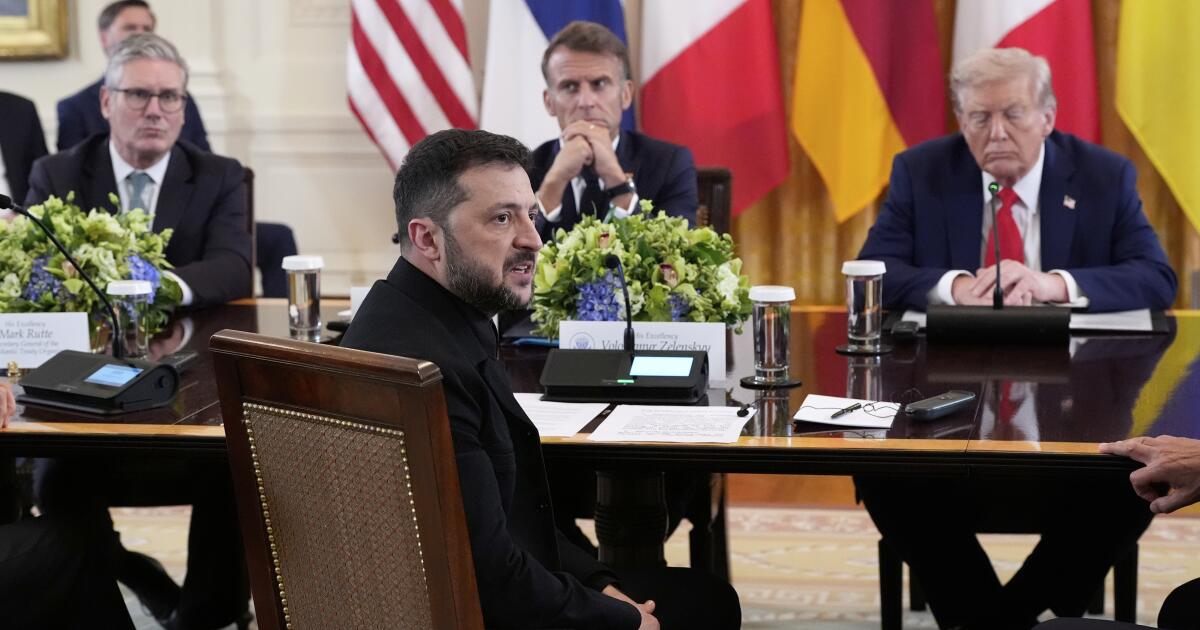WASHINGTON — President Trump on Tuesday offered his assurances that U.S. troops would not be sent to help defend Ukraine against Russia after seeming to leave open the possibility the day before.
Trump also said in a morning TV interview that Ukraine’s hopes of joining NATO and regaining the Crimean peninsula from Russia are “impossible.”
The Republican president, Ukrainian President Volodymyr Zelensky and other European leaders held hours of talks at the White House on Monday aimed at bringing an end to Russia’s war against Ukraine. While answering questions from journalists, Trump did not rule out sending U.S. troops to participate in a European-led effort to defend Ukraine as part of security guarantees sought by Zelensky.
Trump said after his meeting in Alaska last week with Russian President Vladimir Putin that Putin was open to the idea of security guarantees for Ukraine.
But asked Tuesday on Fox News Channel’s “Fox & Friends” what assurances he could provide going beyond his term that American troops would not be part of defending Ukraine’s border, Trump said, “Well, you have my assurance, and I’m president.”
Trump would have no control over the U.S. military after his term ends in January 2029.
The president also said in the interview that he is optimistic that a deal can be reached to end the Russian invasion, but he underscored that Ukraine will have to set aside its hope of getting back Crimea, which was seized by Russian forces in 2014, and its long-held aspirations of joining the NATO military alliance.
“Both of those things are impossible,” Trump said.
Putin, as part of any potential deal to pull his forces out of Ukraine, is looking for the withdrawal of Ukrainian troops from the Donetsk and Luhansk regions, as well as recognition of Crimea as Russian territory.
At the end of Monday’s White House gathering, Trump said he is trying to arrange a meeting between Putin and Zelensky, followed by a trilateral meeting involving himself and the two warring leaders. Details and possible locations were not discussed, but an international arrest warrant for Putin could complicate any such meetings.
French President Emmanuel Macron said it could happen “in Europe” and he’s advocating for Geneva, although he said it could be another “neutral” country. He noted in an interview with French television TF1-LCI broadcast Tuesday that Istanbul hosted the most recent bilateral discussions, in 2022.
Meanwhile, Swiss Foreign Minister Ignazio Cassis said his country would be prepared to organize such a summit, Swiss public broadcaster SRF reported.
Asked about the complication posed by the International Criminal Court’s arrest warrant for Putin, Cassis said “the aim of receiving Mr. Putin in Switzerland without him being arrested is 100% achievable … of course, if he comes to Switzerland for the purposes of peace, for such a multilateral conference, not if he comes for private matters.”
Cassis said arranging for Putin to avoid arrest would require “a certain procedure,” but it could be done “in a few days.”
In the “Fox & Friends” interview, Trump said Putin and Zelensky are getting along “a little better than I thought,” noting the “tremendous bad blood” between them.
He said his perception of their relationship is why he’s arranging for them to meet one-on-one soon, instead of a three-way meeting with himself as sort of a mediator.
“I think they’re doing OK. I wouldn’t say they are ever going to be best friends, but they’re doing OK,” the president said.”
“You know, they’re the ones that have to call the shots,” Trump said. “We’re 7,000 miles away.”
The White House meeting with Zelensky included the leaders of Britain, France, Germany, Italy, Finland, the European Union and NATO.
Trump said the European leaders were not in the room when he spoke with Putin on Monday. He said he thought it would have been disrespectful to handle the phone call that way since Putin and the European leaders meeting with him at the White House haven’t had the “warmest relations.”
But despite that, he said that he has managed to maintain a “very good relationship” with Putin.
Superville and Madhani write for the Associated Press.
